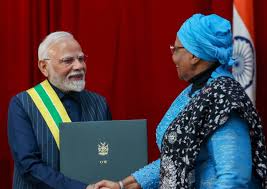Modi, President Ndaitwah hold talks: Namibia to roll out UPI

In a historic move that underscores India’s expanding digital diplomacy in Africa, Namibia has announced it will launch the Unified Payments Interface (UPI) system within its borders by the end of 2025. This decision follows a high-level bilateral meeting between Indian Prime Minister Narendra Modi and Namibian President Netumbo Nandi-Ndaitwah in Windhoek on July 9, 2025.
The talks, held at the State House in Windhoek, marked Modi’s first official visit to Namibia and emphasized India’s growing strategic interest in Africa’s digital and economic development. President Ndaitwah, who recently became Namibia’s first female president, welcomed Prime Minister Modi with full honors, marking a significant moment in diplomatic history.
Digital Diplomacy at the Forefront
A major highlight of the talks was Namibia’s decision to adopt India’s indigenous digital payments technology, the UPI. Originally developed by the National Payments Corporation of India (NPCI), UPI is a real-time, mobile-based payment system that enables instant money transfers using a unique identifier or QR code.
Namibia’s central bank, the Bank of Namibia, had earlier signed a memorandum of understanding with NPCI International in April 2024 to develop a similar payments infrastructure. The rollout later this year will make Namibia the first Southern African country to adopt India’s flagship digital payment platform.
“India is proud to support Namibia in its digital journey. UPI is a symbol of India’s technological strength, and it will empower people and businesses in Namibia just as it has in India,” Modi said during a joint press briefing.
Strengthening Bilateral Ties
The adoption of UPI is part of a larger framework of cooperation between the two nations. Both leaders expressed a commitment to deepen ties in sectors such as:
- Trade and investment
- Healthcare and pharmaceuticals
- Education and capacity building
- Energy security
- Critical minerals and rare earths
- Defense and maritime cooperation
Multiple MoUs were signed during the visit, including the establishment of an Entrepreneurship Development Center in Namibia with Indian support. Namibia also announced its decision to join India-led global initiatives like the Global Biofuels Alliance and the Coalition for Disaster Resilient Infrastructure (CDRI).
UPI’s Global Footprint Expands
Namibia’s move is part of a broader trend of UPI’s international adoption. India has already signed agreements with countries like:
- France
- UAE
- Singapore
- Mauritius
- Sri Lanka
- Peru
- Ghana
Namibia’s decision stands out because it goes beyond enabling Indians to pay using UPI while traveling. Instead, it aims to replicate India’s entire digital payment stack within its own financial ecosystem—making it available to Namibians across cities and rural regions.
Experts believe that Namibia’s UPI rollout will promote financial inclusion, particularly in underbanked and remote areas, while also reducing dependency on cash transactions.
“Namibia adopting UPI is a major milestone for India’s tech diplomacy and for the global South-South cooperation model,” said an Indian diplomat accompanying the delegation.
A Strategic African Partner
Namibia, rich in uranium, lithium, and other critical minerals, is strategically important to India’s energy and technology ambitions. With the increasing global shift towards electric vehicles and renewable energy, India is keen to establish secure, long-term access to these minerals.
In return, Namibia sees India as a trusted development partner—one that brings both technical expertise and respect for sovereignty. Over the years, India has supported Namibia through scholarships, medical assistance, and digital capacity-building programs.
Prime Minister Modi’s visit is being seen as a reset in India–Namibia relations, which had remained cordial but low-profile for the past decade. The trip also fits within India’s larger Africa outreach strategy, which has included recent visits to Kenya, Tanzania, Egypt, and South Africa.
Economic and Social Impacts of UPI in Namibia
The introduction of UPI in Namibia is expected to have far-reaching effects:
| Benefit | Impact |
|---|---|
| Instant Transactions | 24/7 real-time payments will be available across banks and merchants |
| Small Business Empowerment | QR-based payments will help micro and small enterprises operate without POS machines |
| Financial Inclusion | Easier access to banking for people in rural and underserved regions |
| Digital Economy Boost | Encourages cashless transactions, reduces operational costs, and improves transparency |
Namibia’s finance ministry has already begun working with local banks to ensure a smooth rollout. Educational campaigns will be launched to familiarize users with the new system.
A Symbolic Moment in Parliament
Earlier in the day, Prime Minister Modi addressed the Namibian Parliament, where he received a standing ovation and chants of “Modi, Modi” from the assembly. In his speech, he emphasized South-South cooperation, people-to-people ties, and India’s respect for African priorities.
“India does not seek to compete in Africa. We come here to collaborate, to empower, and to learn. Our partnership with Namibia will be based on equality and mutual benefit,” Modi said.
Looking Ahead
With UPI now set to go live in Namibia, the relationship between the two countries is poised to enter a new era of economic, technological, and strategic collaboration. This also strengthens India’s positioning as a digital leader capable of exporting scalable, affordable, and inclusive technology globally.
Namibia’s rollout of UPI is more than just a tech story—it is a reflection of shifting global alliances, digital trust-building, and the growing south-south digital partnerships in the 21st century.






